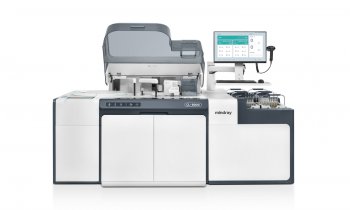News • Urine-based diagnostics
New prostate cancer test to help avoid unnecessary biopsies
A new urine test that measures 18 genes associated with prostate cancer provides higher accuracy for detecting clinically significant cancers than PSA and other existing biomarker tests.

Image source: Vanderbilt University Medical Center
This is according to a study published in JAMA Oncology. The urine test, MyProstateScore 2.0 (MPS2), was shown to meaningfully reduce unnecessary prostate biopsies while providing highly accurate detection of worrisome prostate cancers, the researchers concluded.
“In nearly 800 patients with an elevated PSA level, the new test was capable of ruling out the presence of clinically significant prostate cancer with remarkable accuracy. This allows patients to avoid more burdensome and invasive tests, like MRI and prostate biopsy, with great confidence that we are not missing something,” said Jeffrey Tosoian, MD, assistant professor of Urology and director of Translational Cancer Research at Vanderbilt University Medical Center, who is first author of the study.
Prostate cancer is the most common cancer and the second leading cause of cancer death among men in the U.S. The PSA blood test has been widely used as the initial step in prostate cancer screening. Although PSA is elevated in the vast majority of men with prostate cancer, it is also elevated in a significant proportion of men without cancer. As a result, the use of elevated PSA alone to prompt a prostate biopsy results in numerous unnecessary biopsies. Although generally safe, prostate biopsies are invasive, uncomfortable, and carry some risk of worrisome complications. Therefore, for patients with an elevated PSA, there is a great need for a second-line test to better identify which men truly need a biopsy and which do not.
Because some low-grade prostate cancers do not require treatment and can be safely monitored with an approach termed active surveillance, the MPS2 test was developed to detect more specifically the higher-grade, “clinically significant” cancers in need of early detection and treatment. To do this, the research team analyzed prostate tumors from across the U.S. to identify novel genes more often detected in the presence of significant cancers. The most informative 18 genes were combined into the MPS2 test, which was then tested in a National Cancer Institute trial of men with an elevated PSA level. Uniquely, the authors were able to compare the novel test to other prostate cancer tests, including the original, two-gene MPS test.
Recommended article

Article • Research, diagnostics, therapy
Focus on prostate cancer
Prostate cancer (PCa) is not only one of the most common, but also one of the deadliest types of cancer in men. Diagnostics are correspondingly sophisticated, from imaging via ultrasound or MRI to various biopsy techniques – often even in combination. Keep reading for current developments in early detection, staging, therapy and research.
The study involved 743 men with a median age of 62 years and a median PSA level of 5.6. While existing biomarker tests could have avoided 15% to 30% of unnecessary biopsies (i.e. biopsies that were negative or found low-grade cancers not requiring treatment), use of MPS2 would have avoided 35% to 42% of unnecessary biopsies without missing any additional diagnoses of clinically significant cancer. The improvement was even more pronounced in men with a history of a previous negative biopsy, reducing the rate of unnecessary biopsies from 46% to 51% with use of MPS2, as compared to 9% to 21% for existing tests.
Multiparametric magnetic resonance imaging (mpMRI) is another second-line test that has been utilized, but while it can improve detection of clinically significant prostate cancer, interpretation of the results can be subjective and vary significantly. The authors also noted that mpMRI is not available in some community settings and is not an option for some patients. The current study was not designed to compare biomarkers to mpMRI, but the researchers are currently conducting a prospective, multicenter trial for that purpose.
In patients shown to be without clinically significant prostate cancer by the new test, the authors concluded that the “externally validated performance of MPS2 supports its effectiveness in accurately ruling out the need for mpMRI and biopsy altogether.” They noted a limitation of the study was that only 13% of participants were African American. Because prostate cancer is more prevalent among African American men, the research team is currently pursuing further analyses in more racially diverse populations.
Source: Vanderbilt University Medical Center
21.04.2024











